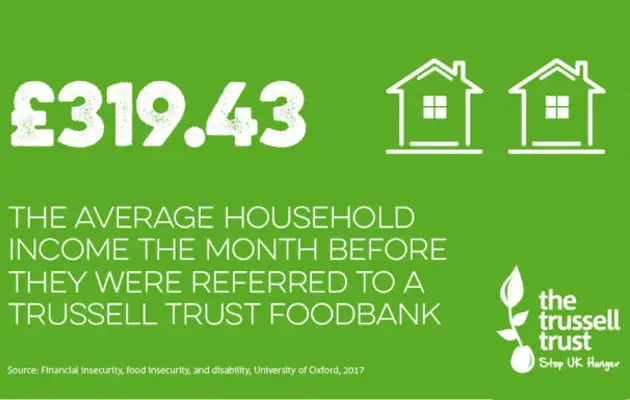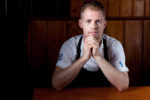Sarah shares this latest news on behalf of Isle of Wight Foodbank. Ed
The Foodbank and their team of dedicated volunteers at Church on the Roundabout in Newport are not only doing vital work to provide emergency food and support to local people who would otherwise face hunger – the foodbank’s volunteers are now also playing a key role in highlighting the reasons why people go hungry and what could be done to stop people needing foodbanks in the future.
Island took part in nationwide study
Isle of Wight Foodbank, which is part of The Trussell Trust’s foodbank network, has been instrumental in gathering data for the single biggest nationwide study of foodbank use to date.
The foodbank’s volunteers worked with University of Oxford researchers to collect data on demographics, income levels, living conditions, health, and food insecurity, all of which provide unparalleled new detail about both the circumstances of people referred to foodbanks and the key drivers of foodbank use.
Click on image to see larger version
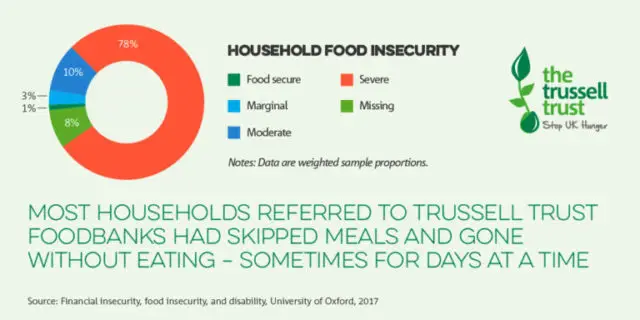
Hannah King, Foodbank Manager at Isle of Wight Foodbank, said:
“In 2016-17 we provided 1987 emergency food parcels to local people in crisis. Our work on the Island is entirely rooted in the community – the foodbank really is local people giving food, money and time to help other local people. The findings of this survey echo what our volunteers have seen in our area on a weekly basis since 2011.
“Falling on hard times after being made redundant or falling sick could happen to anybody, but it’s clear that some peoples’ circumstances make them even more likely to fall through the gaps and need a foodbank’s help.
“We were really pleased to work with the University of Oxford and The Trussell Trust to not only make an immediate impact on the Island but work for future change too. We hope that the time our volunteers gave, and the experiences local people at the foodbank bravely shared in this study, mean that fewer people will need a foodbank in the future.
“We’re certainly looking forward to the day when people don’t need our help, but until that day comes we’ll make sure that everyone referred to us receives a friendly welcome, emergency food and whatever help we’re able to offer.”
78% severely food insecure
The national research highlights the connection between foodbank use and financial insecurity. Almost half of households reported their incomes were unsteady week-to-week, and 78% were severely food insecure (meaning they had gone without eating – sometimes for days at a time – in the past 12 months).
Click on image to see larger version
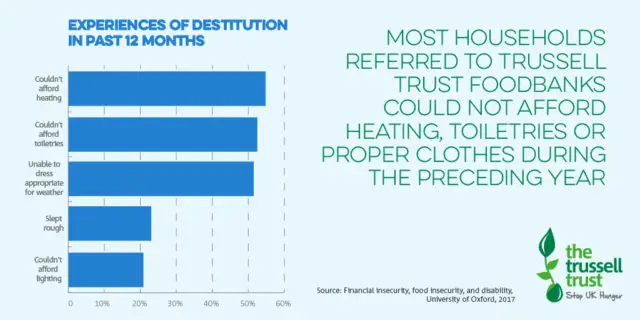
One in three households were finding it difficult to make minimum monthly repayments on outstanding loans and nearly one in five in debt owed money to payday lenders. The reasons three in five households had recently experienced rising or unexpected expenses were linked to higher food expenses by 25% of these households, and to increased housing costs like rent and energy by 28%.
Foodbanks use by the medically vulnerable
The research also provides significant national insights into the proportion of people referred to foodbanks with a disability or mental health issue.
Over 50% of households included someone classed as having a disability and 75% experienced ill health in their household.
Mental health conditions affect people in one in three households.
Reaffirming vital work of foodbanks
David McAuley, Chief Executive of The Trussell Trust, said today:
“These findings reaffirm how vital the work of foodbank volunteers and generosity of donors is, but are also a clear challenge to the new Government to do more to stop people ending up in crisis in the first place. Benefit delays need to be tackled; people with disabilities or mental health conditions need more support.
“Making work more secure and tackling the high cost of living would have a significant impact on the lives of people in extreme poverty. I look forward to working with the new Government to start tackling these issues together.”
Incomes too low or insecure to eat
Dr Rachel Loopstra, the lead author of the report and Lecturer in Nutrition at King’s College London, said today:
“Our study puts the numbers behind the many stories we’ve heard from foodbanks. People using food banks, most of whom are receiving benefits because they are unable to work, have incomes that are too low and too insecure, to ensure they always have enough food to eat.
“Income or expenditure shocks, whether arising from a delay in receiving a benefit payment, from a benefit sanction, or from rising energy costs is enough to tip low income households into foodbank use. But for many, these shocks occur in a context of extreme low income and chronic food insecurity, where meeting basic food needs is an ongoing struggle that precedes foodbank use.
“The severity and chronicity of food insecurity we observed amongst people using food banks is a serious public health concern.”
Click on image to see larger version
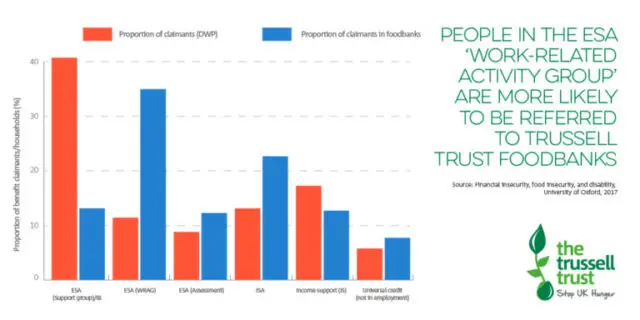
The report
The report emphasises a need for intervention to help reduce extreme poverty and foodbank use and recommends: an inquiry into the adequacy of benefits and support for people with disabilities and health issues that make getting into, or staying in work, difficult; delays in benefit payments are addressed urgently; insecure employment is addressed in order to ensure work pays; and an evaluation on the impact of conditionally, particularly as Universal Credit extends sanctioning benefit payments to people in work.
Download and report the report by visiting the Trussell Trust Website.

